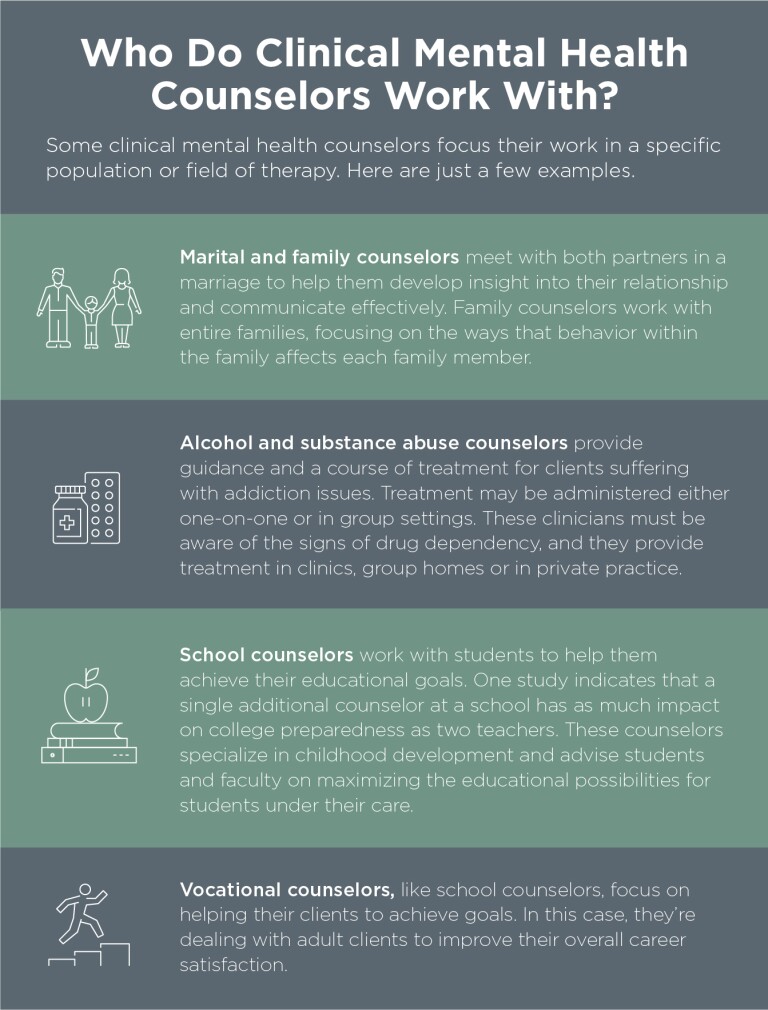A clinical mental health counselor isn’t the same thing as a psychiatrist. For one thing, counselors can’t prescribe medication, but that’s not all. While clinical mental health counselors may work in a clinical setting, they work toward equipping their clients with strategies and frameworks to help them encounter life in mentally healthy ways. This may involve the diagnosis of psychological disorders, but it’s ultimately a more hands-on way of helping people engage fully in their own lives.
What is the job of a clinical mental health counselor?
Clinical mental health counselors are trained counselors and psychotherapists who treat individuals who have mental, emotional or behavioral challenges. They deal with mental health issues, client concerns regarding career or education choices, and with the ways people relate to one another. As such, a licensed clinical mental health counselor must be equipped with both a firm understanding of the principles of psychotherapy and psychopathology, as well as a sense of compassion and social perceptiveness.
What does a day in the life of a clinical mental health counselor look like?
Like most mental health professionals, a counselor’s day will vary with the needs of their clients. There is a lot of freedom in the job, requiring counselors to develop strong critical thinking and decision-making skills. Meeting a client’s needs can take a lot of forms. Some clients may require direct, therapeutic intervention, and a counselor will work to help them articulate their feelings and gain an understanding of themselves and their relationships. With certain clients, counselors may find themselves dealing with healthcare or insurance providers, or updating families, probation officers, police or the courts on changes in a client’s status. No matter the setting or the client, clinical mental health counseling comes down to working with clients to develop skills that help them cope with inner and outer stressors.
As clinicians, counselors must keep careful documentation of their patients’ progress and status, so observational and reporting skills are key tools in the counselor’s toolbox. Counselors spend much of their day preparing reports for staff and clients. The ability to communicate clearly in writing, over the phone and in person is essential for an effective clinical mental health counselor.
Who do clinical mental health counselors work with?
Some clinical mental health counselors focus their work in a specific population or field of therapy. Here are just a few examples.
- Marital and family counselors meet with both partners in a marriage to help them develop insight into their relationship and communicate effectively. Family counselors work with entire families, focusing on the ways that behavior within the family affects each family member.
- Alcohol and substance abuse counselors provide guidance and a course of treatment for clients suffering with addiction issues. Treatment may be administered either one-on-one or in group settings. These clinicians must be aware of the signs of drug dependency, and they provide treatment in clinics, group homes or in private practice.
- School counselors work with students to help them achieve their educational goals. One study indicates that a single additional counselor at a school has as much impact on college preparedness as two teachers.1 These counselors specialize in childhood development and advise students and faculty on maximizing the educational possibilities for students under their care.
- Vocational counselors, like school counselors, focus on helping their clients to achieve goals. In this case, they’re dealing with adult clients to improve their overall career satisfaction.
What kind of training do you need to become a clinical mental health counselor?
It may not come as a surprise that clinical mental health counseling is a field that requires a master’s degree for practice. No matter the specialization, clinical mental health counseling requires a solid grounding in psychotherapy and a strong understanding of human development. Counselors must be trained in psychopathology and have strong observational skills. Handling of confidential patient information requires a firm grounding in the ethical and legal issues surrounding patient care in the U.S. Counselors must also be thoughtful clinicians, well versed in progress measurement assessment methodology. Most importantly, they must be aware of the ways that age and culture can affect human development, and must be prepared to tailor their treatment to meet a client where they’re at.
Discover how William & Mary can help you prepare for an impactful career assisting others in achieving maximum mental health. Explore our Online Master of Education in Counseling with a concentration in Clinical Mental Health Counseling.
- Retrieved on March 16, 2018, from psmag.com/news/school-counselors-youd-think-91339


